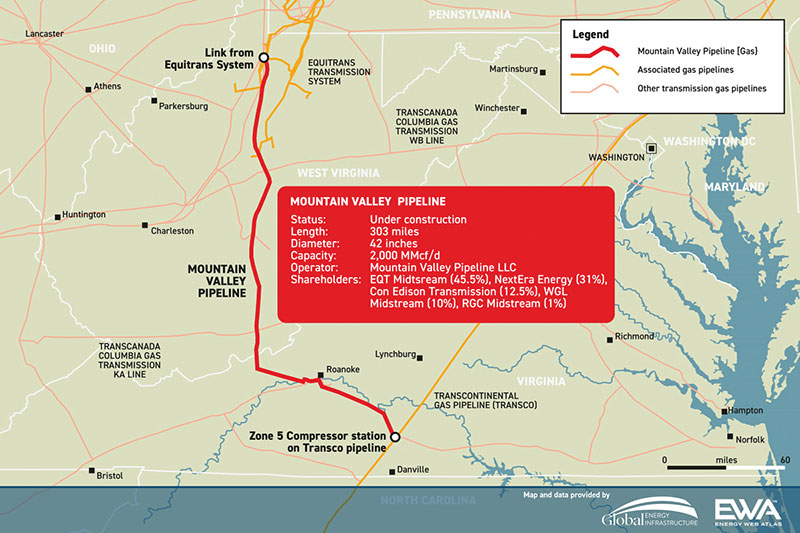MVP Preparing to Weld Final 20 Miles, Targeting Summer 2022 In-Service Date
(P&GJ) — The total project work for Mountain Valley Pipeline (MVP) is nearly 94% complete, and on track for a summer startup after state agencies approved construction permits last month.
MVP, which is owned by Equitrans Midstream, NextEra Energy, Consolidated Edison, AltaGas and RGC Resources Inc., is a $6 billion project spanning about 303 miles across West Virginia and Virginia which should deliver up to 2 billion cubic feet of domestic natural gas per day.
MVP’s originally estimated in-service date was in late 2018, but setbacks including legal challenges from states and environmental groups have delayed the in-service date multiple times.
In January 2021, the joint venture abandoned its plan to use a blanket permit from the U.S. Army Corps of Engineers, which would have allowed the project to cross all streams and wetlands along its route from West Virginia to Virginia.
Some analysts had predicted that seeking individual permits would push the pipeline’s startup date into 2022.
In late December, both Virginia and West Virginia issued Mountain Valley its respective state 401 permits. This state-level approval is one of the necessary inputs for Army Corp of Engineers’ Individual Permit review/approval process, Equitrans Midstream said in a statement.
The Virginia permit has been appealed to the 4th U.S. Circuit Court of Appeals, The Roanoke Times reported.
MVP’s 2021 progress report said that it completed major forward construction activities for the 2021 construction season and is now focusing its efforts on winter stabilization until construction resumes.
“With approximately 20 miles of pipeline welding remaining, Mountain Valley’s total Project work is nearly 94% complete, which includes 55% of the right-of-way fully restored, and the project continues to target a summer 2022 full in-service date,” the report states.
In July, MVP announced a commitment to offset the project’s operational greenhouse gas emissions for the first 10 years of operation. Under the plan, Mountain Valley would purchase carbon offsets to make MVP’s operational emissions carbon neutral. These include carbon dioxide from engines used to drive compressor stations; methane released during operation; and maintenance of the pipeline, as well as carbon dioxide resulting from generation of purchased electricity.
The pipeline is expected to serve the growing energy demand in the eastern United States four completed interconnect facilities which are ready to enter service.
MVP’s design also incorporates four delivery taps to provide access to natural gas supply in West Virginia, Virginia, and North Carolina. Dominion Energy West Virginia and Roanoke Gas Company will both receive natural gas directly from MVP to serve local customers, MVP said.
Editor's note: On Jan. 25, the U.S. Court of Appeals for the 4th Circuit vacated the record of decisions of the U.S. Forest Service and the Bureau of Land Management allowing the pipe to cross about 3.5-miles (5.6-kilometers) through the Jefferson National Forest, potentially delaying the project's completion.
Related News
Related News

- Keystone Oil Pipeline Resumes Operations After Temporary Shutdown
- Freeport LNG Plant Runs Near Zero Consumption for Fifth Day
- Biden Administration Buys Oil for Emergency Reserve Above Target Price
- Mexico Seizes Air Liquide's Hydrogen Plant at Pemex Refinery
- Enbridge to Invest $500 Million in Pipeline Assets, Including Expansion of 850-Mile Gray Oak Pipeline
- Enbridge Receives Approval to Begin Service on Louisiana Venice Gas Pipeline Project
- U.S. to Acquire 3 Million Barrels of Oil for Emergency Reserve in September
- AG&P LNG Acquires 49% Stake in Vietnam's Cai Mep LNG Terminal
- BP's Carbon Emissions Increase in 2023, Ending Decline Since 2019
- Texas Sues EPA Over Methane Emission Rules for Oil and Gas Sector





Comments